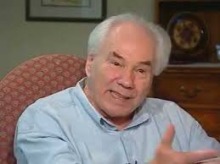Researcher, historian, practitioner and recovery advocate William (Bill) L White has been the most prolific writer in the addiction recovery field. You only have to look at his website. The impact of his ideas, work and writings has been enormous. Here, I include links to a number of my blog posts that focus on Bill White’s writings.
The New ‘William White Papers’ Website
 On May 13, William (Bill) L White posted the following important announcement, The Future of William White Papers Website, on his blog (NB. I have broken up some of the original paragraphs):
On May 13, William (Bill) L White posted the following important announcement, The Future of William White Papers Website, on his blog (NB. I have broken up some of the original paragraphs):
‘This image, which has greeted visitors to my website since its inception in 2009, will soon have a new look. The website has grown to include nearly all of my writings over the past half century, including all of my major papers and monographs on recovery advocacy, recovery management, and recovery-oriented systems of care. Also archived are more than 100 interviews with addiction treatment and recovery advocacy leaders and classic documents on the history of addiction treatment and recovery in the United States and in other countries.
Ash Whitney and Wired In Websites
 This blog post continues the story of my ‘change in career’ early in the new millennium, from neuroscientist working in my research laboratory in a university, to addiction recovery advocate working in the community in Swansea and beyond.
This blog post continues the story of my ‘change in career’ early in the new millennium, from neuroscientist working in my research laboratory in a university, to addiction recovery advocate working in the community in Swansea and beyond.
When I first developed Wired In, a primary aim of our grassroots initiative was to provide information and tools that help people better understand and use the options they have to overcome the problems caused by their own, or a loved one’s, substance use. I also wanted to help ensure that practitioners working in the addiction field, be they specialists or generalists, had access to high quality information about addiction to drugs and alcohol and how it could be overcome.
I wanted to develop a strong Wired In presence on the internet. My aim was realised once I met web designer Ash Whitney in 2000. Ash, who lives in Cilfrew, near Neath in South Wales, built the first Wired In website. Daily Dose was a news and information portal that focused on drug and alcohol problems.
Breaking Trauma Trails: Facilitating the Healing of Indigenous People (Parts 2 and 3)
 2. Working towards solutions with Sharing Culture
2. Working towards solutions with Sharing Culture
We developed Sharing Culture as a way to help tackle historical trauma (and its consequences) and facilitate Indigenous healing.
Sharing Culture is a grassroots initiative based on the core values of authenticity, connection, courage, creativity, empathy and forgiveness. We use a strengths-based, solution-focused approach that celebrates success and fosters positivity, acceptance and cultural pride.
We recognise that self-determinism is a central foundation of healing – solutions must come from Indigenous communities. At the same time, non-Indigenous people can contribute to this healing process in a variety of ways.
One major way that Sharing Culture will facilitate this healing process is to generate high quality educational content and Stories about Indigenous healing and the healing of trauma, and distribute it in the most effective manner to as wide an audience as possible.
The Recovery Scholarship of Ernie Kurtz
 Here’s some great reading for you, from one great scholar and storyteller about another. Bill White starts the New Year with this excellent posting on his blog. Enjoy!
Here’s some great reading for you, from one great scholar and storyteller about another. Bill White starts the New Year with this excellent posting on his blog. Enjoy!
‘One of the distinctive voices within the modern history of addiction recovery is that of Harvard-trained historian Ernie Kurtz.
Spanning the 1979 publication of his classic Not-God: A History of Alcoholics Anonymous to the just-released Experiencing Spirituality (with Katherine Ketcham), Kurtz has forged a deep imprint in studies of the history of A.A. and other recovery mutual aid groups, the varieties of recovery experience, the role of spirituality in addiction recovery, and the personal and clinical management of shame and guilt.
UK Recovery Walk Manchester 2014
Congratulations to the organisers and all participants of the 6th UK Recovery Walk which took place in Manchester over the weekend. It’s wonderful to hear that over 8,000 people attended the Walk!
It’s fantastic to see all the happy faces in the film above.
Recovery is becoming contagious. Please check out the UK Recovery Walk website.
Unrecognised Facts About Psychiatry
I really like the Council for Evidence-Based Psychiatry website, in particular their Unrecognised Facts About Psychiatry. They say:
‘Most people assume that psychiatry is just like any other branch of medicine, with objective tests for diagnoses and drug treatments that cure real diseases. In reality, however, psychiatric diagnoses and treatments differ enormously from diagnoses and treatments for say cancer or diabetes, since, for mental disorders, there are no known biological ‘diseases’ for psychiatric drugs to ‘treat’.
Here we highlight various Unrecognised Facts about modern psychiatry which every patient, practitioner and policymaker ought to be aware of.’
Mindfulness Video Testimonial: Gareth Walker
Gareth, the founder of the Everyday Mindfulness website, talks about the benefits of practising mindfulness and how it helped him changed his life for the better.
‘The cumulative effect of not getting entangled in these stories of the mind has been an enormous benefit to my wellbeing and to the amount of peace I experience. The change in my life has been absolutely enormous.”
‘Five things to make you happier in recovery’ by Peapod

“Helping others is not only good for them and a good thing to do, it also makes us happier and healthier too. Giving also connects us to others, creating stronger communities and helping to build a happier society for everyone.”
Happiness has become a science. You can study happiness and researchers have taken a look at the things that make us happy; they have surprisingly little to do with money.
So much so that some governments are looking at moving away from measuring success by focusing so much on gross domestic product (GDP).
A new initiative called Action for Happiness has suggested ten keys for happier living. There’s not much to argue about there.
I thought, how could you distil, blend and adapt these for recovery? Here’s my attempt:
1. We are happier when we relate to other people So get connected to recovery communities. Find the local mutual aid groups in your town or city – groups like AA, NA, CA and SMART and get involved. The research says that the more involved you get the better the quality of your recovery and the less likely you are to relapse.
Spend quality time with family and friends too.
2. We are happier when we help other people Action for Happiness says this on their website:
‘Helping others is not only good for them and a good thing to do, it also makes us happier and healthier too. Giving also connects us to others, creating stronger communities and helping to build a happier society for everyone.
And it’s not all about money – we can also give our time, ideas and energy. So if you want to feel good, do good!’
My suggestion: help someone at the start of their recovery journey by supporting and encouraging them, or help out a recovering friend who is having a hard time.
3. We are happier when we connect to things greater than ourselves Finding purpose and meaning in life is important to us. I can’t put it better than Action for Happiness does:
‘People who have meaning and purpose in their lives are happier, feel more in control and get more out of what they do. They also experience less stress, anxiety and depression.
But where do we find ‘meaning and purpose’. It might be our religious faith, being a parent or doing a job that makes a difference. The answers vary for each of us but they all involve being connected to something bigger than ourselves.’
So the science backs up finding a power greater than ourselves, though of course this does not need to be a religious power, just something that is outside of us.
What gives you meaning in your recovery?
4. We are happier when we find self-acceptance We spend a lot of time comparing ourselves with others and worrying about how we appear, what we say and how others perceive us. Wasted energy. Being gentle and kind to ourselves leads to more happiness.
Many of us are tortured by shame and guilt and self-doubt in addiction. Recovery is about letting go of that, being our own best friend and being grateful for who we are and what we have.
Being more comfortable in our own skin also helps us to accept others, warts and all.
5. We are happier when we have a positive attitude
More from Action for Happiness:
‘Positive emotions – like joy, gratitude, contentment, inspiration, and pride – are not just great at the time. Recent research shows that regularly experiencing them creates an ‘upward spiral’, helping to build our resources.
So although we need to be realistic about life’s ups and downs, it helps to focus on the good aspects of any situation – the glass half full rather than the glass half empty.’
In the 12-step programme, sponsors will often ask those they are working with to write a ‘gratitude list’ of things they are grateful with in life.
The language of recovery is a positive language and focusing on what’s going well in recovery rather than what’s not will lift us up.
Finishing on a positive Given the thrust of the blog, it seems appropriate to end with a suitable anecdote, which may or may not bring a smile to the lips. The most delicate-natured readers should go no further. This is a true story:
‘President de Gaulle decides to retire from public life and the American Ambassador and his wife put on a grand social function in his honour to mark the occasion.
All the appropriate dignitaries are invited to the ball and dinner. At the dinner table the Ambassador’s wife is placed next to Mm. de Gaulle and they exchange pleasantries between courses
“Your husband has been such a prominent public figure, such a presence on the French and International scene for so many years,” says the Ambassador’s wife. “How quiet retirement will seem in comparison. What are you most looking forward to in these retirement years?”
“Oh, that’s very straightforward… a penis,” Madame De Gaulle replies.
The Ambassador’s wife arches an eyebrow and looks at her cutlery for a long moment. A hush descends over the table. All the assembled dignitaries have heard her answer and no one knows quite what to say next.
“What did you say again?” the Ambassador’s wife eventually pipes up.
“A penis.”
Finally, De Gaulle leans over to his wife and puts everyone out of their misery: “Ma cherie! I believe zee Americans pronounce zat word, appiness.”’







